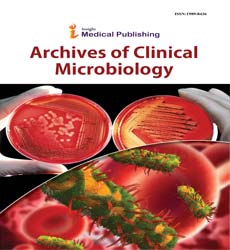Abstract
Interleukin (IL)-1a, IL-7 and IL-13 Profiles among Nigerians with Trypanosoma brucei gambiense Infection
Background Human African trypanosomiasis (HAT) is an endemic parasitic disease exclusively located in intertropical Africa where it is transmitted by the Glossina vector. The diseases processes and in deed the control of this infection partly require an understanding of cytokine immune responses to the disease. The aim of this study therefore is to determine the profiles of IL- 1a, IL-7 and IL-13 among HAT positive volunteers.
Methods and Findings This investigation was carried out in Abraka, a HAT endemic area in Nigeria. Sera from 35 seropositive volunteers were categorized as weakly, moderatelyand strongly positive. Also, 16 of these 35 seropositive subjects demonstrated parasite in the blood and as a result were further grouped into early (n=4) and late (n=12) stages ofHAT based on the demonstration of trypanosomes and the count of white blood cell in the cerebrospinal fluid (CSF). Sera of seropositive volunteers were subjected to interleukins(IL-) (IL-1a, IL-7 and IL-13) assay. Similarly, serum and the CSF of the early and late stages of HAT were also subjected to interleukin test. In the serum, IL-1a levels were significantlyhigher among the strongly positive volunteers than the control subjects (p<0.05). Conversely, depressed levels of IL- _ was seen for HAT late stage (p<0.001). IL-7 level wassignificantly lower in strongly positive individuals than the control volunteers. Also, late stage IL-7 level was significantly depressed (p<0.05). There was no significant differencein IL-13 levels among HAT infected individuals and their non infected counterparts.
Conclusion We suggest that the depressed levels of CSF IL-1a and IL-7 should serve as markers of HAT late stage in Abraka, Nigeria.
Author(s): C Isaac, OP G Nmorsi, I B Igbinosa, EP Imarenezor,, NCD Ukwandu
Abstract | Full-Text | PDF
Share this

Abstracted/Indexed in
- Google Scholar
- Open J Gate
- Genamics JournalSeek
- The Global Impact Factor (GIF)
- Open Archive Initiative
- China National Knowledge Infrastructure (CNKI)
- Scimago
- Directory of Research Journal Indexing (DRJI)
- WorldCat
- Proquest Summons
- Publons
- MIAR
- ResearchGate
- University Grants Commission
- Geneva Foundation for Medical Education and Research
- Secret Search Engine Labs
Open Access Journals
- Aquaculture & Veterinary Science
- Chemistry & Chemical Sciences
- Clinical Sciences
- Engineering
- General Science
- Genetics & Molecular Biology
- Health Care & Nursing
- Immunology & Microbiology
- Materials Science
- Mathematics & Physics
- Medical Sciences
- Neurology & Psychiatry
- Oncology & Cancer Science
- Pharmaceutical Sciences

